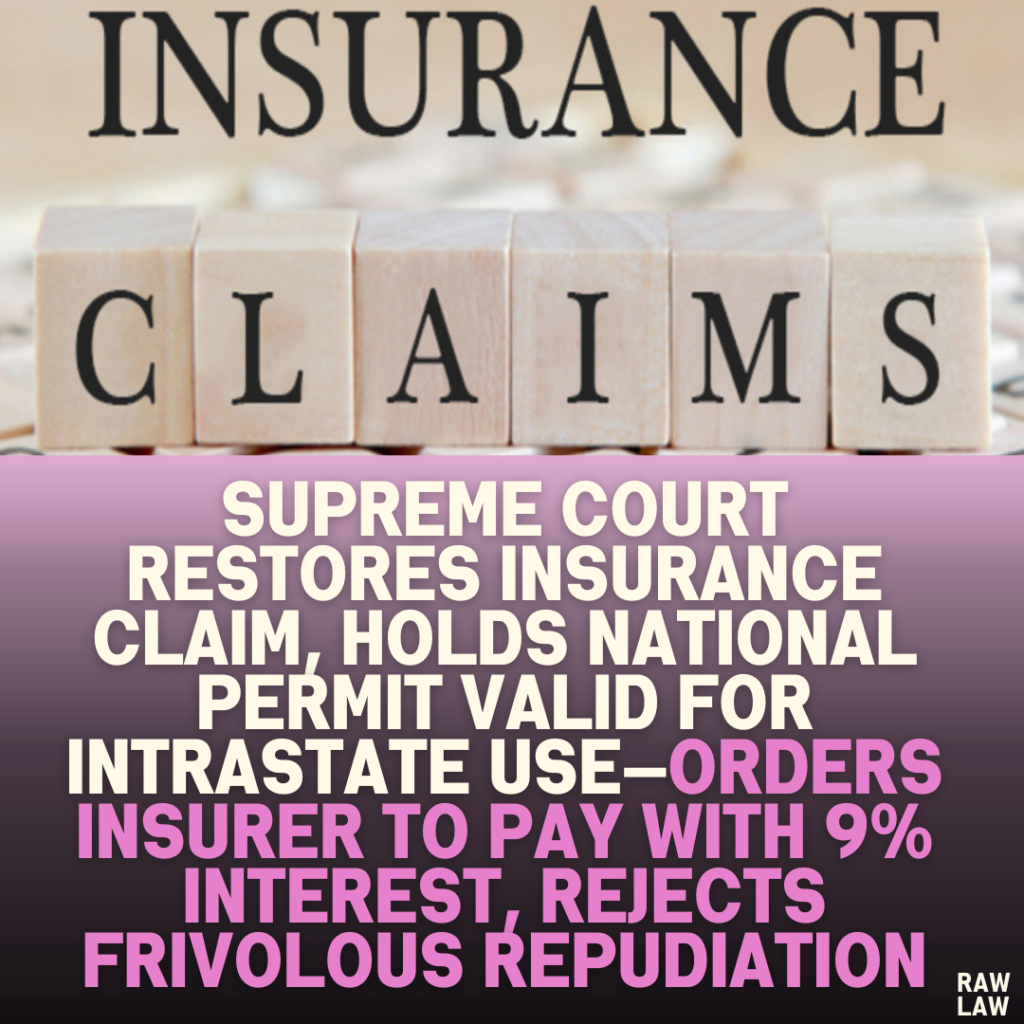Court’s Decision
The Supreme Court allowed the appeal and overturned the National Consumer Disputes Redressal Commission’s (National Commission) order that denied the appellant’s insurance claim. It restored the State Consumer Disputes Redressal Commission’s (State Commission) order, which had directed the respondent insurance company to settle the claim. Additionally, the Supreme Court ordered the insurance company to pay the claim amount along with interest at 9% per annum from the date of the appellant’s complaint until the date of payment. The payment must be completed within 60 days.
Facts
- The appellant owned a truck (TATA-251625.0LPKTC) insured with the respondent National Insurance Company for the period from September 18, 2013, to September 17, 2014.
- On June 8, 2014, during the validity of the insurance policy, the truck caught fire due to a short circuit in the State of Bihar.
- The appellant filed a claim with the insurance company, but the claim was repudiated on the grounds that the National Permit for the truck was allegedly invalid because the authorization fee had not been paid beyond October 14, 2013.
- The appellant then approached the State Commission, which ruled in his favor, directing the insurance company to settle the claim on a non-standard basis.
- Dissatisfied with this decision, the respondent appealed to the National Commission, which reversed the State Commission’s order, denying the claim entirely.
- The appellant then filed the present appeal before the Supreme Court challenging the National Commission’s decision.
Issues
- Was the truck’s National Permit valid on the date of the fire incident?
- Could the insurance company repudiate the claim based on the non-payment of an authorization fee for the permit?
Petitioner’s Arguments
- The appellant argued that the truck had a valid National Permit issued by the competent authority in Bihar, which was valid from October 14, 2012, to October 13, 2017.
- The National Permit required payment of an authorization fee only for operations outside the State of Bihar. Since the truck was being used solely within Bihar, no additional fee was necessary.
- The fire incident occurred within Bihar, and the insurance company’s reason for denying the claim was baseless.
Respondent’s Arguments
- The respondent contended that the permit was invalid because the authorization fee had not been paid beyond October 14, 2013.
- As the permit was allegedly not valid, the insurance company argued that it was justified in repudiating the claim.
- The respondent relied on the precedent set in Amrit Paul Singh & Anr. v. TATA AIG General Insurance Co. Ltd., arguing that an insurance claim cannot be allowed without a valid permit.
Analysis of the Law
- Permit Validity: The Supreme Court carefully examined the permit and found that it was valid until October 13, 2017. The authorization fee was required only when the truck was used outside Bihar. Since the truck caught fire within Bihar, there was no obligation to pay the fee.
- Irrelevance of Authorization Fee: The Court emphasized that the lack of an additional authorization fee did not render the permit invalid for intrastate use.
- Unjust Denial of Claim: The Court held that the insurance company’s repudiation of the claim on this ground was frivolous. It observed that the permit had been issued by a competent authority in Bihar, and the terms of the permit did not require payment of the authorization fee for operations within the state.
Precedent Analysis
- National Insurance Co. v. Nitin Khandelwal: The State Commission had relied on this precedent to decide in favor of the appellant. However, the National Commission rejected this reliance, distinguishing the present case as involving fire damage rather than theft.
- Amrit Paul Singh & Anr. v. TATA AIG General Insurance Co. Ltd.: The National Commission relied on this case to deny the claim, asserting that the absence of a valid permit invalidated the insurance claim. The Supreme Court distinguished this precedent, holding that the facts of the present case were different, as the permit here was valid for operations within Bihar.
Court’s Reasoning
- The Court observed that the National Permit was valid and dismissed the argument that the lack of an additional authorization fee made the permit invalid.
- The Court stated:”The respondent company could not have repudiated the claim on such a frivolous ground.”
- The Court concluded that the insurance company had no justification for denying the claim, as the permit terms explicitly allowed the truck’s operation within Bihar without payment of the authorization fee.
Conclusion
The Supreme Court:
- Set aside the National Commission’s order denying the claim.
- Restored the State Commission’s decision to settle the claim.
- Directed the insurance company to pay the claim amount along with interest at 9% per annum from the date of the appellant’s complaint until the actual payment. The payment must be completed within 60 days.
Implications
This judgment underscores the importance of fair treatment in insurance claims. It clarifies that insurance companies cannot deny claims based on technicalities that are inconsistent with the terms of the contract or the law. The decision also highlights the judiciary’s role in protecting consumer rights and ensuring that insurers adhere to their obligations in good faith.




Pingback: Supreme Court: Interest on Compensation Under Employee’s Compensation Act is Mandatory at 12% Per Annum; Insurer Liable Without Right to Recover from Employer - Raw Law